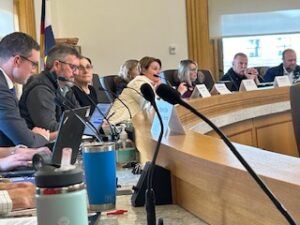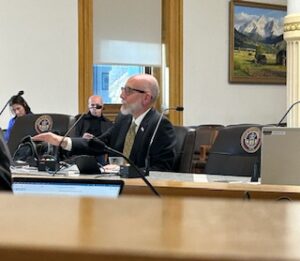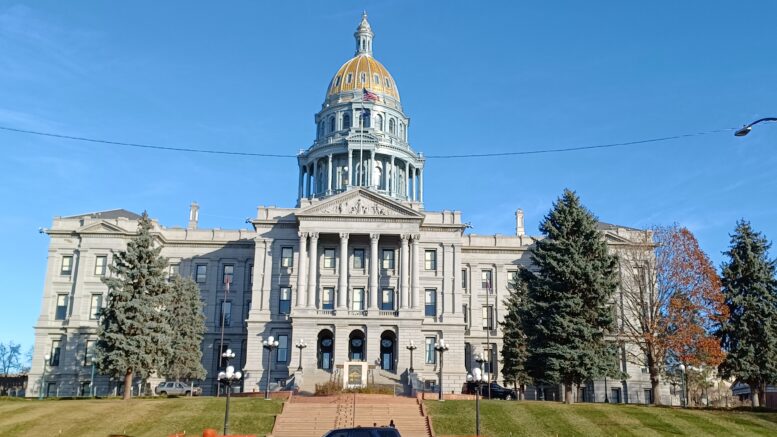While Colorado property valuations spiked enough this year to necessitate a ballot initiative, a special session and a commission to study them, that commission learned during its first meeting Wednesday that assessments may flatten or even decrease by next year.
That revelation, offered by an economist for the nonpartisan Colorado Legislative Council, illustrates the complexity of the work facing the Commission on Property Tax. The 19-member body, the product of a November special session that offered short-term residential property tax relief but failed to produce a long-term plan, has until March 15 to recommend to the Legislature a comprehensive solution on spiking property-tax bills.
Commissioners — who include representatives of state and local governments, experts in the field of taxation and two business-group leaders — spent their first meeting getting an immersive education about the state’s property-tax system. While property taxes are collected and used by local governments, the state has an interest in the revenue stream that helps to fund local education, and legislators have OK’d three bills in the past three years offering relief to homeowners and sometimes commercial-property owners.
The flurry of activity this year around property taxes sprang from the fact that average property values spike 24.8% statewide due to the booming post-pandemic real-estate market — 43.4% for residential valuations and 24% for non-residential valuations. Because of the trio of bills that have temporarily lowered property valuations and assessment rates, the average increases in tax bills will be lower, but homeowners still face 27.9% boosts in their bills and commercial property owners will owe 22% more.
Record valuation hikes expected to cool
“This is a once-in-a-decade, once-in-a-couple-of-decades rise in the value of home prices,” said Greg Sobetski, chief economist for the Legislative Council.

Members of the Commission on Property Tax ask questions during its initial meeting on Wednesday.
However, David Hansen, the Legislative Council’s specialist in property and severance taxes, noted that the runaway market may finally be stopping to catch its breath. State officials are estimating that assessed home values will go up just 15% between 2022 and 2024 – with actual values jumping just 1.2% because of the repeated tax breaks — and commercial-property values will rise just 0.7% and see a 2.3% decrease in actual value.
While homeowners and commercial-building operators likely will breathe a sigh of relief at the news, that significant fluctuation from the spike in property values that occurred between mid-2020 and mid-2022 means the commission is likely to be cautious in suggesting large tax cuts. That’s particularly true because after such a boom, future economic downturns could bring a decrease in the value of properties, which would impact local services from law enforcement to libraries that are dependent on property-tax income, several members proffered.
“We have a very dynamic situation that we are facing — super-important, of course, for our constituents and super-important for the services that government provides,” said Democratic Sen. Chris Hansen of Denver, who is chairing the commission. “My hope is that we can cast a very wide net at lots of policies and lots of ideas, not worrying about where they came from.”
How the Commission on Property Tax got here
Legislators passed a bill on the final day of the 2023 session to establish a ballot initiative, Proposition HH, that would have lessened the rise in most property tax bills, but it asked voters also to raise the Taxpayer’s Bill of Rights caps in return and limit future tax refunds. Roughly 59% of voters rejected the measure at the November ballot.
So, Gov. Jared Polis called a special session in which majority Democrats passed a bill to reduce residential-property valuations by $55,000 each for this property-tax year and to drop residential assessment rates from 6.75% to 6.7% for this one year. The bill did not offer any additional relief to non-residential property owners, however, and a separate bill that created the new commission was viewed as the best way to address that need.
The commission’s work comes while a trio of groups are pushing measures for the 2024 ballot to deal with property taxes, giving it urgency to come up with a solution that could be seen as a consensus plan and forestall potentially pricey election battles. Advance Colorado hopes to cap future property-tax bill increases at 4% annually, Colorado Concern hopes to roll assessments back to 2020 levels and cap future hikes as well, and the Bell Policy Center wants to allow legislators to raise taxes on homes worth $2 million or more to make up for any revenue lost by the passage of other measures.
Potential focus of debate
While no one suggested any proposals yet to come from the commission, several members seemed to hint at what will be a central question for the group to answer.

Former state budget director Henry Sobanet speaks to the Commission on Property Tax on Wednesday.
Colorado Chamber of Commerce President/CEO Loren Furman asked presenter Henry Sobanet, who served as head of the budget office for both Republican and Democratic governors, if there would be a scenario where the state got out of the property-tax debate and pushed it down to the local level, where taxes are collected. And Hansen followed up by noting that Colorado is dependent on the property taxes to fund education but doesn’t receive tax revenues directly.
“Our top question here is: What should the state’s role be?” Hansen asked.
The commission is set to meet again next at 1 p.m. on Jan. 5 in the Old State Library in the state Capitol, just five days before the beginning of the 2024 legislative session.
